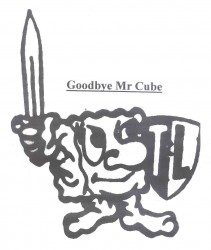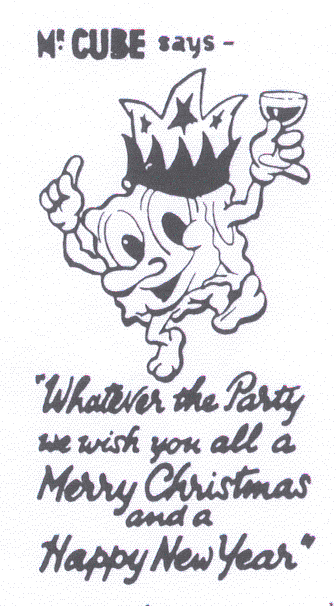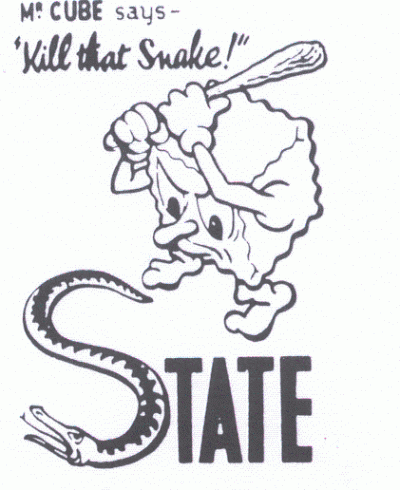Love Lane Lives
The history of sugar in Liverpool and the effects of the closure of the Tate & Lyle sugar refinery, Love Lane
A bitter sweet Christmas Story from the last millennium
Written by Ron Noon at 16:45 on Monday, December 22nd 2008

MR CUBE’S CHRISTMAS CAROL
This is a bitter sweet story about Tate & Lyle’s Liverpool pensioners. They were eagerly anticipating, the 1999 company supported “biennial” Christmas party, in the Britannia Adelphi hotel, only to be shocked and saddened by the contents of a letter from John Walker, the Managing Director of the Sugar Giant’s European Division. It announced that “regrettably, this reunion will be the last one held”. The final sentence, hanging ominously over the famous animated company cartoon of fifty years young, sword and shield brandishing Mr Cube, stressed how “this has been an extremely difficult decision to take but I hope you will understand that the company has to continually review and reduce its costs”.
Albert E Sloane, a sweet fightin’ man who had figured prominently in the ten year struggle to prevent the closure of the comically misnamed Love Lane refinery, the mother plant in Henry Tate’s sugar dynasty, was clearly very angry with this attempted “rationalisation”. He’d never lived his working life as a cost of production and yet History appeared to be repeating itself as another Tate & Lyle sponsored domestic tragedy for the feisty 77 year old. These thoughts flicked through his mind as he and the surviving boys and girls from the whitestuff assembled for their last Christmas Party, beneath resplendent streamers strung across the banqueting hall of a once quite magisterial hotel. Cold business logic was matched by the weather outside on Thursday December 2nd, and even when wrapped up in sugar coated management rhetoric the perception by the majority, who like Albert had devoted most of their working lives to this company, was of nothing less than scrooge like meanness of spirit. Smile it’s Tate & Lyle. No thankyou. This is Liverpool.
The closure in April 1981, not only obliterated a prominent landmark which had dominated the Vauxhall and Scotland Road communities just north of the city centre, but also the job prospects of Albert and so many others in that ageing labour force, who would never work again. That had not prevented them partying every other Christmas in the Adelphi, re-living their memories and stories of the world of work and increasingly friends that they had lost. Albert’s close mate John Maclean, wryly commented that not only did “Christmas come round every two years with Tates”, but “each time, absent friends meant that it got cheaper. We never thought they’d scrap it altogether”. Deja Vu. They never thought that the giant sugar refinery on the site of a former Maidens and ladies walkway, which at one time employed over three and a half thousand workers, would be scrapped. Unhappily on the threshold of the Twenty First century, the removal of company backing has irrevocably scuppered the vicarious but vitally important associational needs that the biennial Christmas bash made formal provision for.
Katie Moran, an eighty four year old former shop steward who had struggled alongside Albert and John in the campaign to save the Liverpool refinery, made a valedictory comment out of an entreating question. “But this is the parting of the ways, is n’t it, the last supper?” Katie who had been awarded the British Empire Medal for services to charity and trade unionism was clearly savouring the enjoyment of this last chinwag opportunity with her old pals. The sadness was tangible and an invisible funeral pall seemed to drape over the main hall as they trooped disconsolately out after their “last supper”. Later on that evening I sat in the pub opposite, listening to many of these wonderful workers reminiscing their very real history of Love Lane, a living history that surely deserves much more than tape recorders and sympathetic academics. The Tate’s pensioners packed “chocablock” into the Beehhive on Mount Pleasant St, evoked many images of warmer climes to help dispel the gloom and cold outside. The giant fibrous reeds of sugar cane that sway in the tropical breezes and sunshine of African, Caribbean, and Pacific, countries were once processed, refined and packaged by these scousers. “They knew each other when they were young, packing the bags which sweetened the nation’s tea. And they were sad that this was their final party together.”
Strange to reflect that at the beginning of the millennium sucrose was very much a new kid on the sweetener block compared with honey. In an even earlier biblical epoch it was a land of milk and honey and decidedly not sugar and spice. Eventually it was discovered that the “crystallised sunlight” from the cane produced its own taste of honey and without any intervention from bees it would develop into an agro-industrial process. The transformation from giant reeds to white sucrose which is now part of the “natural” architecture of processed foods even when demand for sugar packets is in relative decline, required a boiling, laundering, purging, and refining process that is quintessentially industrial. It had entailed the refined interference of the boys and girls in the Beehive that once worked in the romantically named Love Lane, and were now in this final gathering place in Mount Pleasant.
This public house provides a marvellously convivial atmosphere in a cosmopolitan city of the sea where skeins of interconnectedness have never stopped at the waters edge and where global relations and historic waves of inward and outward migration helped shape a distinct culture and way of life many years before the “isation” was tagged on to global to become the dominant metaphor of these so called post-modern times. “Strange that an article so sweet and necessary for human existence should have occasioned such crimes and bloodshed” was the valediction of Dr Eric Williams, Oxford don and one time Prime Minister of Trinidad. (Capitalism and Slavery 1944) His reminder of the moral stain on a taken for granted everyday commodity was conditioned by its association with the most infamous of all trades and Liverpool was stained by the fact that in the eighteenth century it rose to become the capital of the slave trade. That nefarious aspect of Liverpool’s history and its role in the African Diaspora ended 65 years before Henry Tate set up his then state of the art Sugar refinery in Love Lane.
On this party night towards the end of the long Twentieth Century there was no shortage of liquid means of sweetening the imagination and memory, including the obligatory tots of demarrarah rum. The best stuff to an afficionado of “rumbullion” is produced in the exotic Antilles, not in wet Fenland England where it’s actually impossible to produce rum from the ugly “mangel wurzel” sugar beet and its extracted molasses that stink of ammonia. Predictably the mood shifted and became one of terminal nostalgia. “We don’t need the Adelphi, just any old venue with a few pies and sausage rolls thrown in so we can continue to meet”, was the unanimous sentiment being expressed. But even in this buzzing and hospitable pub with the best old time juke box in the port, it would be an impossible stretching of imagination and catering to accommodate over 400 ex sugar cane workers.
As a partisan local labour historian committed to writing a history from below of the vainglorious struggle to keep Love Lane open, my subjectivity is partially eclipsed by what most decent outsiders would view as the crass insensitivity of Mr Cube’s company. This is after all a world leader in sugar and sweeteners, a transnational that not only started its life in Liverpool but always claimed to encourage a “family spirit” with its loyal employees. The recruitment policy had been that children followed parents into the “sugar mill” and so parallel to the Tate & Lyle dynasties were “hereditary” employees families where sometimes three generations would be working at the company stove. Today’s mismatch between company representation and perceived realities is not just the obvious fact that this decision is patently out of synch with seasonal festivities, but also with its own history of public relations and friendly Mr Cube image?
How ironic that exactly fifty years ago in December 1949, the animated sugar lump was reaching his apotheosis. The “disembodied, impertinent cartoon figure…with his huge eyes and a face able to depict any kind of emotion” was created by a former cartoonist with the Daily Express, St John Cooper. His creation in August was sponsored by Tate & Lyle and Aims of Industry, an organisation that worked steadfastly to help the company resist the much exaggerated threat of sugar industry nationalisation. By the end of the year the circulation and sales of millions of sugar packets containing Mr Cube’s messages and slogans was such that this sugar lump was a household name. Armed with a sword and shield to resist the socialist hydra, and with cold war sound bites that made Government ministers, especially Herbert Morrison, almost apoplectic with rage, the company’s brand image was transformed out of all proportion. “Mr Cube says ‘state control will make a hole in your pocket and my packet’”, and “Mr Cube says of nationalisation ‘Oh dear, dear! - Dearer’”, but the simplest and most effective was “Tate not State”.
All of this “propaganda” was amplified by newspaper column inches of free coverage! There was 1800 column inches recorded in the National press that end of year, as opposed to 200 in August. Intriguingly the question of how much a 1949 scale of national exposure would cost today, is not merely one of arithmetic and monetary adjustment. That sly insidious “if” world may be appropriate here, because Albert Sloane’s suggestion is of a cantankerous Mr Cube stripped of his sword and shield, wearing Scrooge hat and matching ball and chain!
It was all so different half a century ago both for the family firm of the merged Tate & Lyles, formed in 1921, and for a young shop steward working in the oppressive heat of the historic mother plant. After registering his vote for Clem Atlee’s Labour in India the proudly working class Mr Sloane returned to Britain to follow his father’s footsteps into a job which was recognised in the local community as “a job for life”. Working conditions did not stand out as particularly good, indeed the purging, processing and refining of raw sugar cane was always an unrelentingly hard taskmaster. Nevertheless the zeitgeist in the Lane was paternalistic, and by constantly promoting the culture of a ‘family like company spirit’ Tates was perceived outside as actually being very proud of its reputation of looking after its workers. Before the era of faceless accountants and outsiders in the boardroom, “wannabee family executives” had to experience going through the sugar mill and learning the production side of things alongside ordinary employees before they could advance their careers.
An amusing cameo scene set in Love Lane at the time of the nationalisation threat when the company was exhorting employees throughout the country to come up with suggestions to add spice to Mr Cube’s campaign centred around the witty and irreverent Mr Sloane. The man who thirty years later was one of the most prominent in the struggle to keep the plant open suggested that “Tate & Lyle have made a pile, give it to the rank and file”.
Frank Till who joined the company in 1941 and rejoined in 1947, after service in the RAF, expressed it this way. “The people who run Tate & Lyle now are just names to us. Previously we knew them - Saxon Tate, Colin Lyle, Nicholas Tate, we knew them all, but not now. They are unidentifiable people and of course we are unidentifiable to them.” In fifty years there has clearly been a transformation from family firm and one time imperial sugar company possessing sugar plantations in the Caribbean and Africa, to a Giant services and consultancy transnational. Although core refining activities were downsized in the seventies so as to expand into “speculative” commodity transactions and new profit areas, including even an ill timed venture into skateboards, Tate & Lyle is now a Group well equipped to capitalise on the growth potential of a global industry of sweeteners and starches. Demographics and expanding food and non food uses will continue a global success story of at least six centuries that makes the products of Bill Gates seem pre-pubescent. Except in one sense. Tate & Lyle made a pre-tax profit of only £223m in the 12 months to last September but having now reviewed and eliminated the drain on finances caused by the Liverpool biennial Christmas bash Mr Cube is emblematic of a Group much better positioned to face the new challenges and profit potential offered by the coming Millennium.
By Christmas of 1949 Tate & Lyle had clearly perfected the arts of Public Relations and much to the chagrin of Clem Atlee, Mr Cube successfully dominated the anti-nationalisation campaign. His spiritual “father” was the President of the Group, the charismatic Lord Lyle, a close friend of the Opposition leader, Winston Churchill, and nicknamed by journalists as “Lord Cube”. The metamorphosis from a family firm into the financial community of transnationals has inexorably witnessed a withering away of local roots and loyalties.
Global perspectives and significant organisational and personnel shifts, have seriously compromised the Sugar Giant’s paternalistic image, at least in Liverpool. Up until this month though, the end of sugar cane time in April 1981, and the subsequent blighting of that inner city community, was viewed as the most dramatic consequence. But now it seems Henry Tate the wealthy entrepreneur and philanthropist has unintentionally bequeathed to the world a soulless global corporation that has now scrapped Christmas in his former sugar capital. The company decision to continue the tradition of delivering a Christmas hamper to its non-executive employees was the last vestigial relic of what had once been a local family firm. But as the barman in the Beehive called out the very last orders from the partying but increasingly dejected looking pensioners, that token gesture looked about as substantial as the froth on Albert’s pint of bitter.

